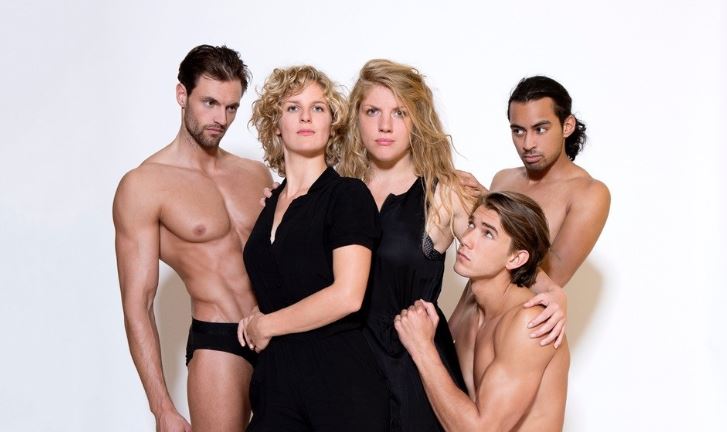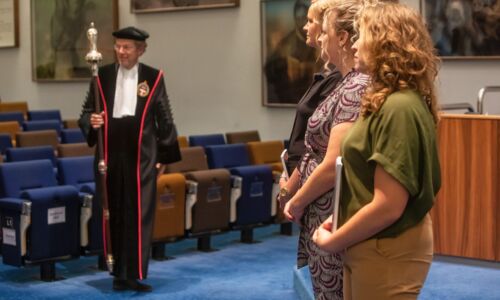Or you go for polyamory
-
 Photo: Fred van Diem
Photo: Fred van Diem
Simone van Saarloos enjoys stepping off the beaten path. Especially when it comes to love. 'Even as a young child I would look at all these monogamous heterosexual relationships, and think: this isn’t what I want.'
‘Which of you here has ever had a polyamorous relationship?’ In the LUX hall, where the theme for tonight is a Radboud Reflects event on polyamory, more than half the audience raise their hand. Among the other half, a large majority says they’re interested in such a relationship. If you’re assuming the audience is full of hippies, you’ve got another thing coming. This is a very diverse audience, both in type and in age: students, people in their 30s, people in their 50s, men and women.
The audience’s response suggests that polyamory – having multiple relationships – is on the rise. Of course, this audience is somewhat biased: a lecture on polyamory is likely to attract a lot of people who are interested in such relationships. But still: the event more than sold out.
Safety
Tonight in LUX the honour of speaking to us about polyamory falls to philosopher Simone van Saarloos. Two years ago she wrote a book entitled Het monogame drama (The Monogamous Drama). Monogamous relationships are not in themselves a problem, she argues. But the fact that we seem to need them to lead to a successful and happy life is. ‘What we see now, I think, is that people want long-term, monogamous relationships because they seek comfort and safety in an increasingly individualised world. The outside world seems so frightening that we need relationships to experience safety and familiarity. But I wonder: if the distance between a safe private life and an unsafe outside world is so great, isn’t that what we should work on changing?’
‘I’m not advocating some kind of hedonistic shopping around, with a new partner every week’
This is why she calls herself ‘a permanent single in contact’. According to her, this term does more justice to reality. Because in principle, we’re all alone, vulnerable, and looking for contact with others. ‘I’m not advocating some kind of hedonistic shopping around, with a new partner every week,’ explains Van Saarloos later that week on the phone. ‘On the contrary, for me it’s all about connection and contact. But why can’t you have this kind of contact with more than one person?’
Dead white men
Van Saarloos doesn’t give away much about her personal life. Here’s what we do know about her: she’s always busy, has published three books, spends half her time in the Netherlands, and the other half in the US, studied Literary Studies and Philosophy, but now hates ‘reading only books by dead white men’. She has multiple relationships, with men and women. She’s recently taken to writing her name as Simon(e) – with brackets around the ‘e’ – to emphasize the effect of gender in her name. And in the last elections she appeared on the list for BIJ1, Sylvana Simons’ political party that nearly made it to the Dutch Parliament.
One thing is clear: Van Saarloos is not into pigeonholing and “doing things according to the book”. Especially not when it comes to love. ‘Even as a young child, I would look at all these monogamous heterosexual relationships, and think: this isn’t what I want. Gradually, by reading a lot, and thinking and experimenting, I discovered that polyamory suits me much better.’
Her main goal is not happiness, says Van Saarloos. ‘The thing is, we tend to say: “Just be yourself, then you’ll be happy.” But for many people this ‘being yourself’ is not that self-evident. A white monogamous heterosexual man still has an easier time of it than a black lesbian polyamorous woman. It doesn’t work to say to this kind of person ‘just be yourself’. For that to be possible we first have to change something in our society.’
Family gathering
So she leaves the monogamous beaten path – and stimulates others to follow suit. Including students. ‘Students are also encouraged to either have a long-term relationship or to jump into bed with a new person every night. On the one hand, you’ve got the old aunt grilling you at every family gathering on whether you already have a boyfriend or girlfriend. On the other hand, you have a student culture of scoring and one-night stands.’ But according to Van Saarloos, you don’t have to let yourself be pushed into either of these corners. You can also remain open to multiple relationships.
Society benefits from the idea that we all just keep doings things the way we’ve always done them. It’s nice and tidy. But as a result we run the risk of forgetting that monogamy is just a game we invented: there are other ways of living. ‘Look at Facebook. It gives you three options: you’re in a relationship, you’re single, or ‘it’s complicated’. I’d like to tell people: it’s always complicated.’
Doesn’t she run into problems? ‘Of course I do. I get jealous sometimes. But the point is: all relationships run into problems at times. If you follow the beaten path, it’s a bit less noticeable. You can read about it in women’s magazines: Has the spark gone out of your relationship? In polyamorous relationships, you have different problems. But if you dare to look at them, they turn out to be quite manageable.’
‘I have a monogamous partner who doesn’t mind me having other relationships. But do you know what does bother her? All these people telling her: “You know, I saw Simone yesterday with someone else. Doesn’t that make you jealous?” She’s OK with it, but the stigma – that’s what really gets in the way.’
[kader-xl]
In short
Simone van Saarloos (1990) is a writer, columnist and politician. She studied Philosophy and Literary Studies at the University of Amsterdam and The New School in New York. In 2015 she published Het monogame drama (The Monogamous Drama), in which she advocates polyamory.
In 2013, together with Niña Weijers, she presented The Sexist Talk Show, which featured only female guests. Van Saarloos writes columns for nrc.next and in the last elections she appeared on the candidate list of Sylvana Simons’ party.
[/kader-xl]



